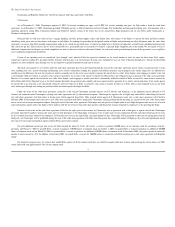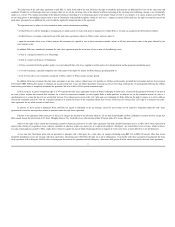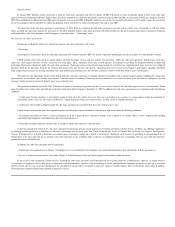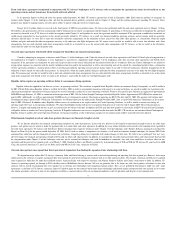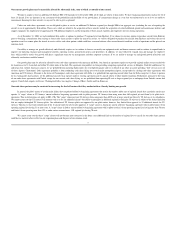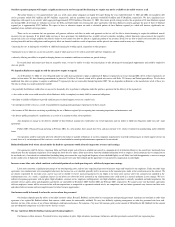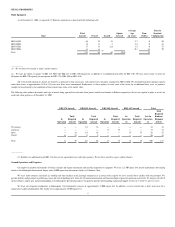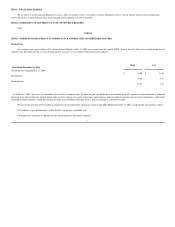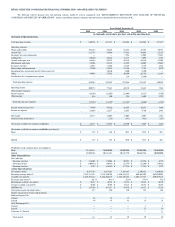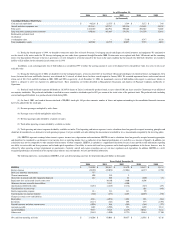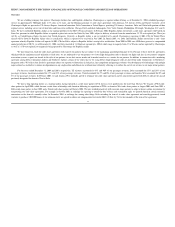Frontier Airlines 2004 Annual Report Download - page 25
Download and view the complete annual report
Please find page 25 of the 2004 Frontier Airlines annual report below. You can navigate through the pages in the report by either clicking on the pages listed below, or by using the keyword search tool below to find specific information within the annual report.
We are at risk of losses stemming from an accident involving any of our aircraft
.
While we have never had a crash over our 30 year history, it is possible that one or more of our aircraft may crash or be involved in an accident in the future, causing death or injury to
individual air travelers and our employees and destroying the aircraft.
In addition, if one of our aircraft were to crash or be involved in an accident we would be exposed to significant tort liability. Passengers, or their estates, may seek to recover damages
for death or injury. There can be no assurance that the insurance we carry to cover such damages will be adequate. Accidents could also result in unforeseen mechanical and maintenance costs.
In addition, any accident involving an aircraft that we operate could create a public perception that our aircraft
are not safe, which could result in air travelers being reluctant to fly on our aircraft
and a decrease in revenues. Such a decrease could materially adversely affect our financial condition, results of operations and the price of our common stock.
We will be controlled by Wexford Capital as long as they own or control a majority of our common stock, and they may make decisions with which you disagree.
WexAir LLC, which is owned by several investment funds managed by Wexford Capital, on a fully diluted basis own beneficially approximately 59.5% of the outstanding shares of our
common stock. As a result, Wexford Capital and its affiliates will control all matters affecting us, including the election of directors as long as they own or control a majority of our common stock.
They may make decisions which you and other stockholders will not be able to affect by voting your shares.
We may have conflicts of interest with Wexford Capital, and because of their controlling ownership, we may not be able to resolve these conflicts on an arm's length basis.
Wexford Capital and its affiliates are actively engaged in the airline business. Conflicts of interest may in the future arise between Wexford Capital and us in a number of areas relating to
our business and our past and ongoing relationships. Factors that may create a conflict of interest between Wexford Capital and us include the following:
•
Wexford Capital currently owns Shuttle America, the lessee of the Saab aircraft previously operated by Chautauqua;
•
Wexford Capital may in the future make significant investments in other airline companies that directly compete with us;
•
sales or distributions by WexAir LLC of all or any portion of its ownership interest in us; and
•
several of our directors also are directors, managing members or general partners of Wexford Capital and its affiliates.
Wexford Capital is under no obligation to resolve any conflicts that might develop between it and us in a manner that is favorable to us and we cannot guarantee that such conflicts will not
result in harmful consequences to our business or future prospects. In addition, Wexford Capital and its affiliates are not obligated to advise us of any investment or business opportunities of
which they are aware, and they are not restricted or prohibited from competing with us. We have specifically renounced in our certificate of incorporation any interest or expectancy that Wexford
Capital and its affiliates, including its directors and officers, will offer to us any investment or business opportunity of which they are aware.
Risks Associated With The Airline Industry
The airline industry is highly competitive.
Within the airline industry we not only compete with other regional airlines, some of which are owned by or operated as code
-
share partners of major airlines, but we also face
competition from low
-
fare airlines and major airlines on many of our routes, including carriers that fly point to point instead of to or through a hub. Other low
-
fare carriers serve the Indianapolis
International Airport, which results in significant price competition in the Indianapolis market, one of our major markets. Competition in the eastern United States markets, which we service from
US Airways' hubs in New York, Boston, Philadelphia and Washington, D.C. and from Delta's hub in Orlando is particularly intense, due to the large number of carriers in those markets.
In addition, some of our competitors are larger and have significantly greater financial and other resources than we do. Moreover, federal deregulation of the industry allows competitors
to rapidly enter our markets and to quickly discount and restructure fares. The airline industry is particularly susceptible to price discounting because airlines incur only nominal costs to provide
service to passengers occupying otherwise unsold seats.
In addition to traditional competition among airlines, the industry faces competition from video teleconferencing and other methods of electronic communication. New advances in
technology may add a new dimension of competition to the industry as business travelers seek lower
-
cost substitutes for air travel.
The airline industry has been subject to a number of strikes which could affect our business.
The airline industry has been negatively impacted by a number of labor strikes. Any new collective bargaining agreement entered into by other regional carriers may result in higher
industry wages and increase pressure on us to increase the wages and benefits of our employees. Furthermore, since each of our code
-
share partners is a significant source of revenue, any labor
disruption or labor strike by the employees of any one of our code
-
share partners could have a material adverse effect on our financial condition, results of operations and the price of our
common stock.
Airlines are often affected by certain factors beyond their control, including weather conditions which can affect their operations.
Generally, revenues for airlines depend on the number of passengers carried, the fare paid by each passenger and service factors, such as timeliness of departure and arrival. During
periods of fog, ice, low temperatures, storms or other adverse weather conditions, flights may be cancelled or significantly delayed. Under our fixed
-
fee code
-
share agreements, we are partially
protected against cancellations due to weather or air traffic control, although these factors may affect our ability to receive incentive payments for flying more than the minimum number of flights
specified in our code
-
share agreement. Should we enter into pro
-
rate revenue sharing agreements in the future we will not be protected against weather or air traffic control cancellations and our
revenues could suffer as a result.
The airline industry has recently gone through a period of consolidation and transition; consequently, we have fewer potential partners.
Since its deregulation in 1978 and continuing to the present, the airline industry has undergone substantial consolidation, and it may in the future undergo additional consolidation. For
example, in April 2001, American acquired the majority of Trans World Airlines, Inc.'s assets. Our relationship with American resulted from this transaction. Other recent developments include
the domestic code
-
share alliance between United and US Airways, and a similar new relationship among Delta, Continental and Northwest. We, as well as our code
-
share partners, routinely
monitor changes in the competitive landscape and engage in analysis and discussions regarding our strategic position, including potential alliances and business combination transactions. Further
consolidation could limit the number of potential partners with whom we could enter into code
-
share relationships. Any additional consolidation or significant alliance activity within the airline
industry could materially adversely affect our relationship with our code
-
share partners.
19


